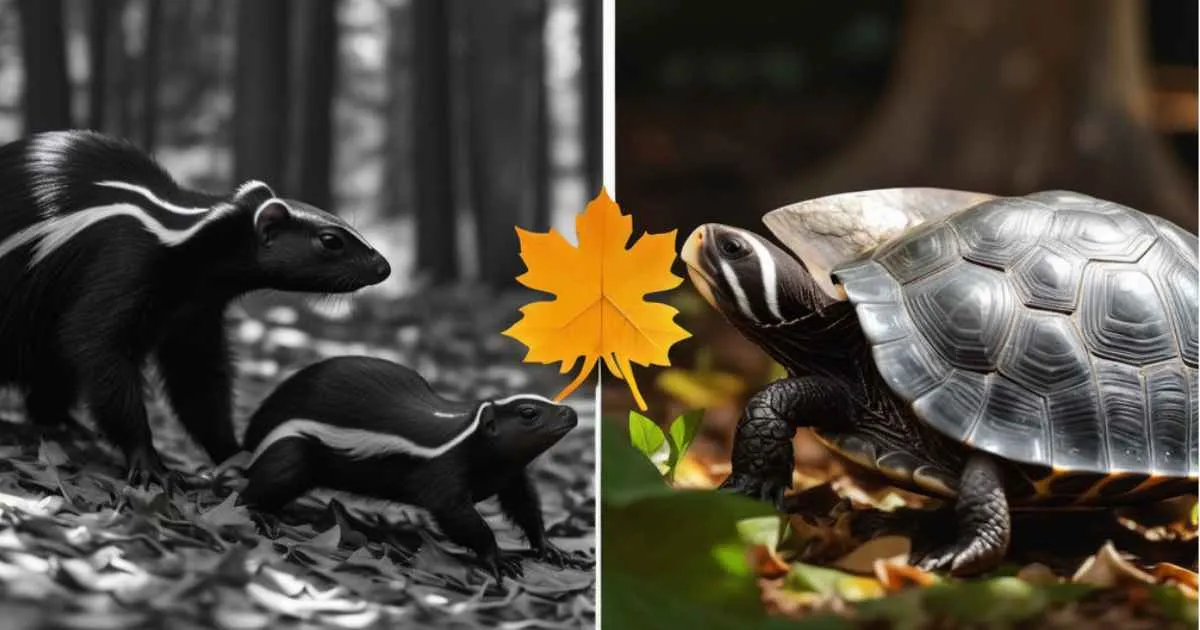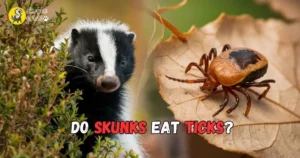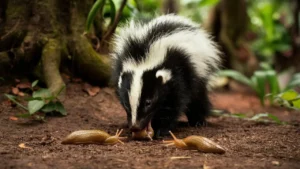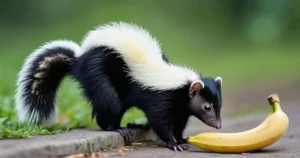Do Skunks Eat Turtles? Vet Approved Facts & Concerns
As a skunk enthusiast and wildlife observer, I’ve learned that these striped mammals are opportunistic feeders with a diverse diet. But what about turtles? Do skunks eat turtles? The answer is yes, though it’s not a common occurrence. Skunks are more likely to eat turtle eggs or hatchlings rather than adult turtles. With their sharp claws and keen sense of smell, skunks are skilled at finding and raiding turtle nests, making them a natural predator in some ecosystems.
In this article, we’ll explore how skunks interact with turtles, their impact on turtle populations, and ways to protect turtles while coexisting with these fascinating creatures.
Skunks’ Diet: What’s on the Menu?
Skunks are omnivores, which means their diet includes a mix of plant and animal matter. They eat what’s most accessible, adapting to their environment and the season. Here’s a look at the skunk’s typical menu:
Animal-Based Foods
- Insects (beetles, crickets, grubs)
- Small rodents (mice, voles)
- Amphibians and reptiles (frogs, lizards, turtle eggs)
- Birds’ eggs and nestlings
Plant-Based Foods
- Fruits and berries
- Seeds and nuts
- Vegetables and grasses
Turtle eggs and hatchlings are appealing to skunks due to their high nutritional value and ease of access. Adult turtles, however, are rarely targeted because of their hard shells and size.
Do Skunks Eat Turtles or Just Their Eggs?
Skunks are opportunistic predators and scavengers, meaning they’ll take advantage of any available food source. Here’s how skunks interact with turtles:
Turtle Eggs
Skunks are notorious for raiding turtle nests. Using their sharp claws and keen sense of smell, they can detect and dig up buried turtle eggs. These eggs are rich in protein and easy to consume, making them a highly sought-after food item.
Hatchlings
If skunks encounter newly hatched turtles making their way to water, they may prey on them. Hatchlings are small, vulnerable, and lack the protective shell strength of adult turtles, making them easy targets.
Adult Turtles
While skunks are unlikely to attack adult turtles, they might scavenge on injured or deceased turtles. The hard shell of an adult turtle acts as a natural defense, deterring most predators, including skunks.
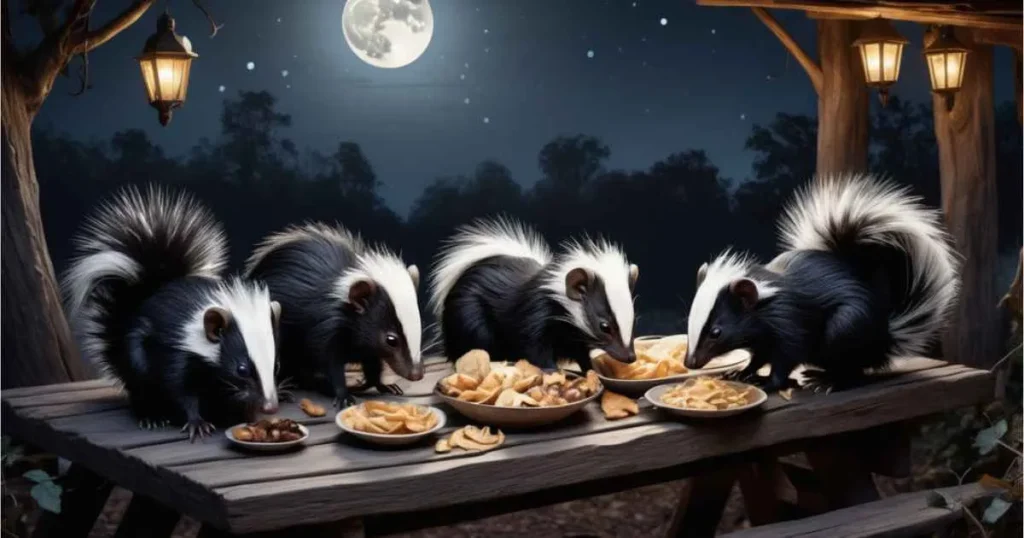
Impact on Turtle Populations
Turtle populations face many threats, and predation by skunks is one of them. Skunks play a natural role in ecosystems, but their egg-raiding behavior can affect local turtle populations, especially in areas where turtles are already struggling due to habitat loss or climate change.
Threats to Turtle Nests
- Ground-nesting turtles, like snapping turtles and painted turtles, are especially vulnerable to skunks.
- Skunks often destroy entire clutches of eggs, which can reduce the number of hatchlings in a season.
Ecological Role of Skunks
Despite their impact on turtle nests, skunks also help control insect and rodent populations, contributing to ecosystem balance. It’s a delicate dynamic where skunks serve both as predators and pest controllers.
How Skunks Find and Raid Turtle Nests
Skunks are well-equipped for locating turtle nests. Their nocturnal nature allows them to forage under the cover of darkness, and their powerful noses detect buried eggs with remarkable accuracy.
Key Tactics Skunks Use
- Keen Sense of Smell: Skunks can detect the scent of turtle eggs buried under soil or sand.
- Digging Ability: With strong claws, skunks can quickly unearth turtle nests.
- Opportunistic Foraging: Skunks patrol areas near water bodies where turtles commonly lay their eggs.
Protecting Turtles From Skunks
While predation is a natural process, there are steps you can take to protect turtle nests, especially in areas where turtles are endangered or conservation efforts are underway.
For Nesting Areas
- Install Barriers: Use mesh or wire to cover turtle nests without blocking the hatchlings’ exit.
- Mark and Monitor Nests: Keep an eye on known nesting sites during the egg-laying season.
- Natural Deterrents: Spread strong-scented materials like predator urine or chili powder near nests to discourage skunks.
In Your Yard
Lighting and Motion Sensors: Skunks are nocturnal and shy away from well-lit or active areas.o not usually eat turtles. Their hard shells protect them. Yet, turtles must fend off other hungry creatures.
Secure Trash: Skunks are attracted to food scraps, so ensure trash bins are tightly sealed.
Remove Attractants: Clean up fallen fruit, birdseed, or other food sources that might lure skunks to your property.

The Role of Skunks in the Ecosystem
Skunks, despite their egg-raiding tendencies, are valuable members of the ecosystem. They help control pests like insects and rodents, which can benefit gardens and crops. Their omnivorous diet means they adapt to various habitats, from forests to urban areas.
Balancing Conservation Efforts
- Protecting turtle populations doesn’t mean eliminating skunks. Instead, focus on measures that allow both species to thrive.
- Conservation programs often include predator management and habitat restoration to support vulnerable turtle populations.
Frequently Asked Questions
Do Skunks Eat Baby Turtles?
Yes, skunks may eat baby turtles if they encounter them. Hatchlings are small and lack the protective shells of adults, making them easy prey.
How Can I Protect Turtle Nests From Skunks?
Use protective barriers like wire mesh or fencing to cover nests. Avoid leaving food sources that attract skunks near nesting areas.
Are Skunks a Major Threat to Turtles?
While skunks can impact turtle populations by preying on eggs and hatchlings, they are just one of many natural predators. Habitat destruction and human activity pose greater threats to turtles overall.
Conclusion
So, do skunks eat turtles? The answer is yes, but mostly their eggs and hatchlings. These opportunistic feeders play a complex role in the ecosystem, balancing predator-prey dynamics. By understanding their behavior and taking proactive steps to protect turtle nests, we can coexist with skunks while supporting turtle conservation efforts.
Whether you’re a wildlife enthusiast or simply curious about nature, learning about these interactions helps us appreciate the intricate web of life around us. Skunks and turtles may seem like unlikely connections, but their interactions remind us of the importance of preserving balance in the natural world.

